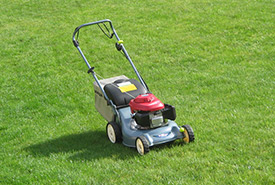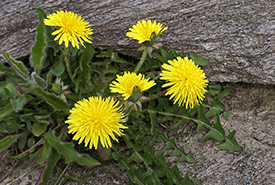Get grass off your lawn! Why manicured lawns may not be so natural after all

Mowers release pollutants - just one the negative effects of having a turf grass lawn (Photo courtesy Wikimedia Commons)
It’s summer! Oh, what a beautiful time! Most of us spend many hours during the summer watering our turf grass lawns, pulling weeds out of our turf grass lawns, spraying our turf grass lawns with various growth enhancing chemicals and mowing our turf grass lawns, all so that we can make utterly sure that we are not deemed the-guy-with-lots-of-dandelions-on-his-lawn.
Since the 1960s, the importance of having a perfectly manicured lawn has grown, to the point that it has become a social norm. Thousands of Canadians have grass lawns, and so no one really questions the effects of having one. Most people are actually surprised to hear that grass lawns have a negative effect on the environment and on humans as well!
So, you say, what exactly are the negative effects of having a turf grass lawn? Well, let’s get started!
To begin, the use of electric lawn mowers and gas-powered garden tools is highly detrimental to the environment. It has been estimated that the average riding mower emits the same amount of carbon emissions and pollutants in one hour as 34 cars! These harmful pollutants pose health risks to both humans and animals, as they affect our air quality. As an alternative, try using a push mower, and pulling weeds by hand.
Next, fertilizers, herbicides, and pesticides can easily be transferred into large bodies of water such as the Great Lakes, and into smaller bodies of water such as rivers and streams. Some communities, such as in Halifax, Nova Scotia, the use of pesticides for cosmetic purposes has been banned for several years now. In Ontario the ban on pesticides for cosmetic purposes has improved local water quality.
Maintaining a turf grass lawn also requires a huge amount of water. Billions of gallons of water are used everyday for lawn maintenance. Overuse of water can decrease the amount of groundwater that is available for humans and animals. This in turn can have a negative effect on wildlife, through decreasing the amount of water available for plant life and animal species. In addition, decreasing amounts of groundwater can increase the likelihood for salt water to enter the groundwater system, thus affecting the purity of our drinking water.

Dandelions (Photo by Randi Hausken)
In addition, grass is not a suitable food source for many insects, causing their numbers to decrease. This affects all other animals who consume these insects for food, meaning that turf grass is less able to support biodiversity, and thus affects entire ecosystems.
What’s to be done?
Many of the plant species that are deemed “grass alternatives” originate in Europe or Asia. This increases the risk that these plants will carry diseases that may be harmful to native plants. Planting native plants helps to create habitats for native animal species. Native plants have already adapted to your environment, meaning that they do not require much maintenance. In general, all they need is a bit of water, if it’s drought season, and some hand weeding .
Of course, every region has different native plants, so the best way to determine which plants are native to your area is to contact your local naturalist club, visit a native plant nursery or contact a local ecologist. If you have turf grass on your lawn and need to remove it in order to plant your native plants, there are many easy ways to do so.
Although native plants are the best alternative, there are some other ways in which you can reduce the harmful effects of your grass lawns without having to remove your grass completely:
- Reduce the amount of grass you have by planting low-maintenance shrubs, trees and perennials. Or, lay down stone or tile instead of grass.
- Use organic fertilizers and weed removing alternatives.
- Purchase a non-mechanical mower, and pull weeds by hand.
- Water your garden with recycled rain water that you can collect yourself in buckets. You can also water your plants with old cooking water.


